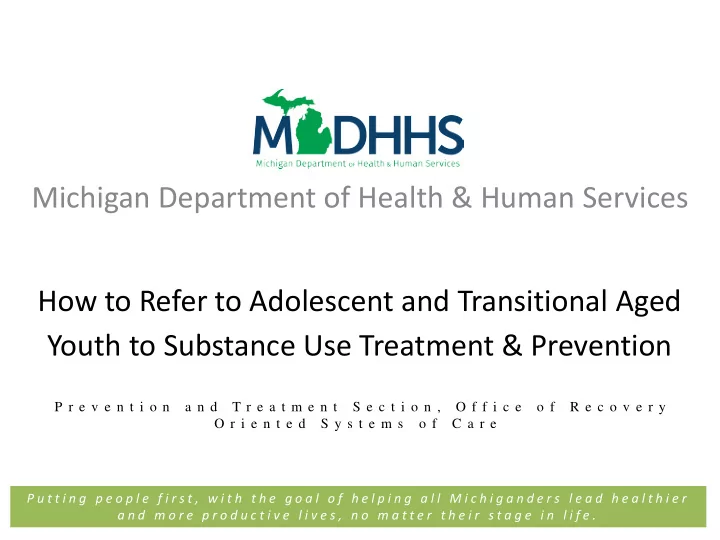

Michigan Department of Health & Human Services How to Refer to Adolescent and Transitional Aged Youth to Substance Use Treatment & Prevention P r e v e n t i o n a n d T r e a t m e n t S e c t i o n , O f f i c e o f R e c o v e r y O r i e n t e d S y s t e m s o f C a r e P u t t i n g p e o p l e f i r s t , w i t h t h e g o a l o f h e l p i n g a l l M i c h i g a n d e r s l e a d h e a l t h i e r a n d m o r e p r o d u c t i v e l i v e s , n o m a t t e r t h e i r s t a g e i n l i f e .
Determine the Nature of the Substance Use Different Type of Use = Different type of Referral Types of Use: Considering use • • Experimental use • Recreational use • Risky use • Problematic use Dependence/Disorder • Still need a Referral even if there is no Dependence
Refer to Prevention or Treatment Prevention Programs Treatment Programs – Appropriate for youth: – Appropriate for youth: • Recreational Use (or • Considering Use Prevention) • Experimental Use • Risky Use (or Prevention) • Recreational Use • Problematic Use • Beginning Risky Use • Dependence – Commonly used • Disorder prevention model: Strengthening Families and Prime for Life
Accessing services • Youth can access treatment without parental knowledge or permission – Substance Use Disorder (SUD) as young as 12 – When providing SUD treatment must follow the 42 CFR Part 2 • Determine what type of insurance the youth has – Private Insurance – contact provider for covered programs – Always call the Prepaid Inpatient Health Plan (PIHP)
Referrals for Youth covered by Medicaid & Block Grant Always Call the Prepaid Inpatient Health Plan PIHP
Prepaid Inpatient Health Plans
Prevention Contacts • Region 1: Gery Shelafoe (906) 225-5149 • Region 2: Marie Halveston (231)487-9144 Region 3: Stephanie VandDerKooi (231)332-3846 • • Region 4: Achilies Malta (269)202-8637 • Region 5: Jill Worden (517) 253-7525 • Region 6: Katie Postmus (734)222-3841 • Region 7: Jane Goerge (734)222-3842 Region 8: Karra Thomas (313)833-2418 • • Region 9: Dawn Radzioch (586)469-5278 • Region 10: Lisa Coleman (810)496-5544
Treatment Access System • www.michigan.gov/bhrecovery • Region 1: 800-305-6564 • Region 2: 800-834-3393 • Region 3: Varies based on county Region 4: 800-781-0353 • • Region 5: 844-405-3095 • Region 6: 800-440-7548 • Region 7: 800-241-4949 • Region 8: 800-350-0900 Region 9: 586-948-0222 • • Region 10: 888-225-4447
Types of Treatment/Levels of Care American Society of Addiction Medicine Criteria • Level 1 = Outpatient Services • Level 2.1=Intensive Outpatient Services • Level 2.5=Partial Hospitalization Services • Level 3.1=Clinically Managed Low-Intensity Residential Services • Level 3.5=Clinically Managed Medium-Intensity Residential Services • Level 3.7=Medically Monitored High-Intensity Inpatient Services • Level 4=Medically Managed Intensive Inpatient Services
Issues and Concerns • Why do youth need a referral to specialized prevention and treatment programs? • How does this treatment differ from what is offered through primary care or through school health center? • Long-term outcomes w/o early treatment = decades of use and multiple treatment episodes
Resource and Contact Information Michigan Department of Health and Human Services, Office of Recovery Oriented Systems of Care at www.michigan.gov/bhrecovery. Contact: • Treatment: Beth Cooley– State Youth Project Coordinator at cooleyb@michigan.gov or (517) 373-1177 • Prevention: Kelli Martin - Specialist/PFS 2015 Project Director at MartinK18@Michigan.gov or 517-335-0121
Recommend
More recommend